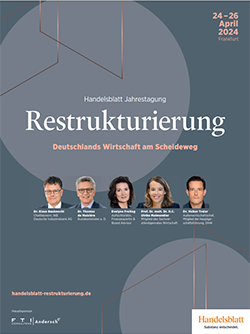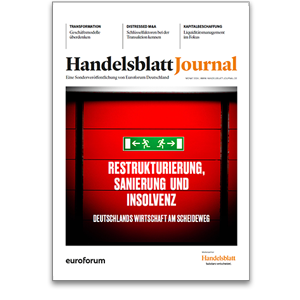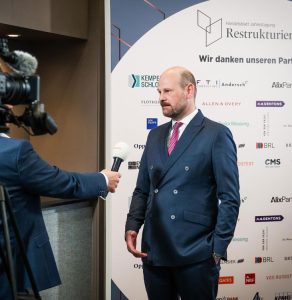3 Tage geballtes Wissen und Networking auf der Handelsblatt Restrukturierung.
zur Bildergalerie



Deutschlands Wirtschaft am Scheideweg
Die Aussichten für die deutsche Wirtschaft im Jahr 2024 bleiben schwierig. Schwankende Energie- und Rohstoffpreise, geopolitische Spannungen und der sich immer stärker bemerkbar machende Fachkräftemangel sind die Ursachen der angespannten Wirtschafts- und Haushaltslage. Insolvenzen nehmen zu und einige Branchen sind besonders betroffen, wie der Handel, die Bau- und Immobilienbranche sowie Industrien, die hohen Energieverbrauch haben. Die Infrastruktur bleibt das Nadelöhr und es müssen Lösungen gefunden werden. Wichtige strukturelle Transformationen müssen jetzt eingeleitet werden, damit deutsche Unternehmen zukunftsfähig bleiben. Vom 24.-26. April 2024 werden zum 20. Mal Experten und Entscheidungsträger der Restrukturierungsbranche Strategien diskutieren, die Unternehmen dabei unterstützen, sich neu aufzustellen und die sich bietenden Möglichkeiten zu nutzen. Wir freuen uns darauf, gemeinsam mit Ihnen Lösungen zu diskutieren!

Neue Strategien sind gefragt. Wer jetzt klare Entscheidungen trifft, Prozesse anpasst, Lösungen findet, der profitiert. Wie stellt man das Unternehmen nachhaltig resilient auf, damit es auch gegen zukünftige Krisen und Herausforderungen gerüstet ist und flexibel reagieren kann?
Ein Blick zurück: Begeisternde Impressionen von der Handelsblatt Jahrestagung Restrukturierung 2023
Impressionen 2023
Werden Sie Teil der Handelsblatt Jahrestagung Restrukturierung und stellen Sie ihr Unternehmen und Ihre Expertise in den Fokus
Ticketpreise
Young Leader Event ab 400€
Focus Day ab 1900€
Jahrestagung Restrukturierung ab 2400€
Datum und Uhrzeit
Mittwoch, 24.04.2024, 09:00 Uhr –Freitag, 26.04.2024, 17:00 Uhr zum Kalender hinzufügen
Veranstaltungsort
Hilton Frankfurt City Centre
Hochstraße 460313 Frankfurt am Main

























